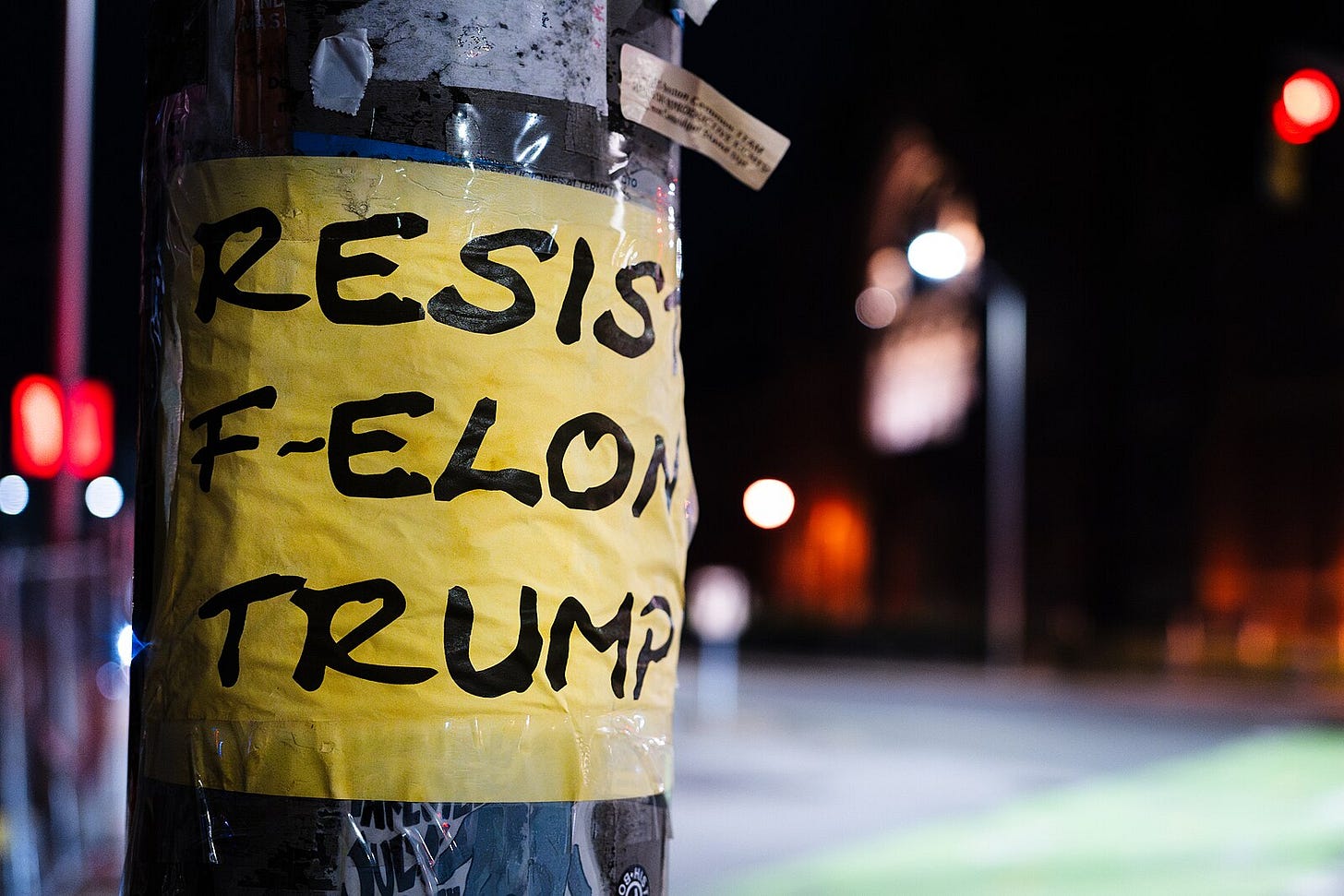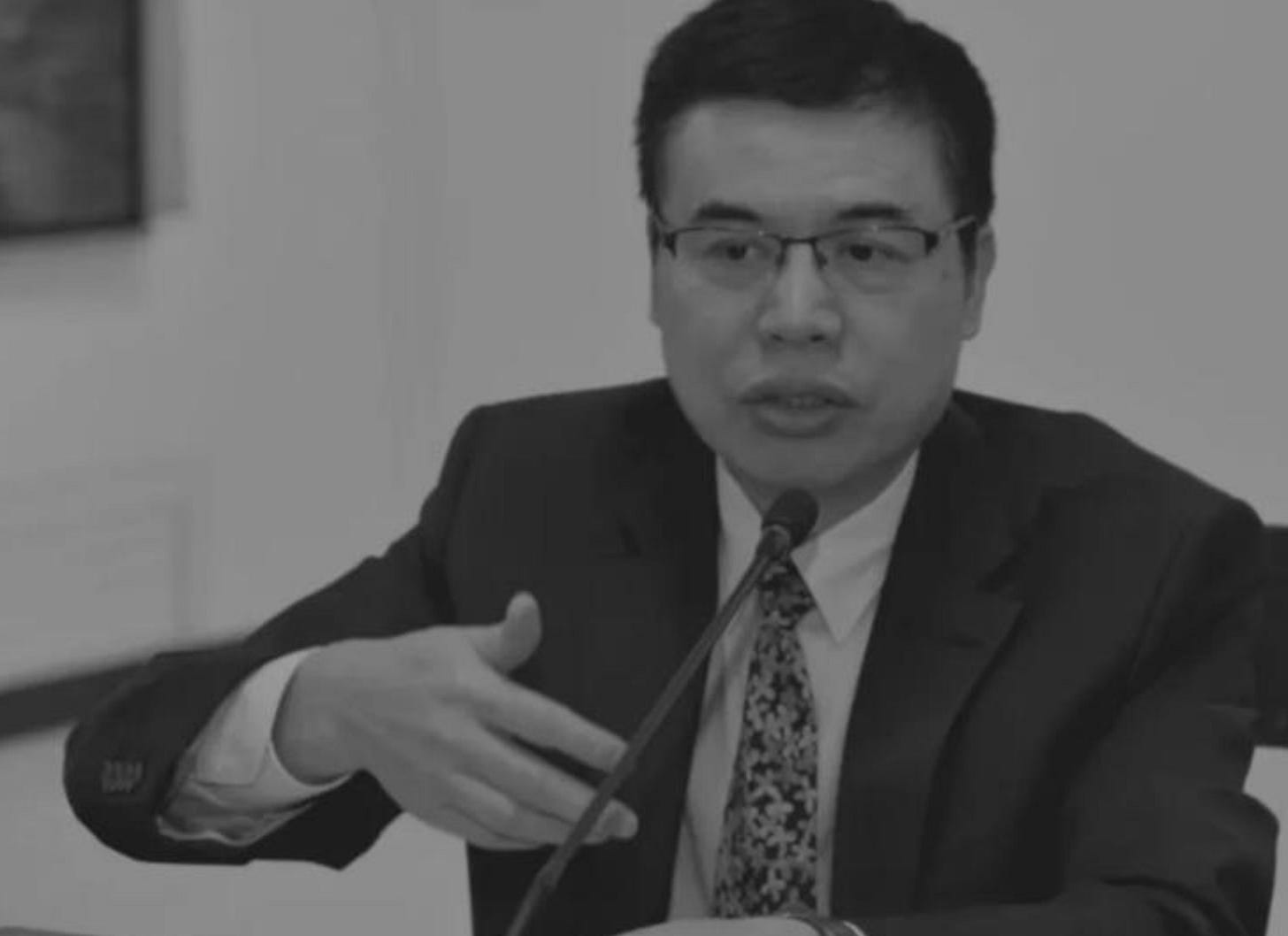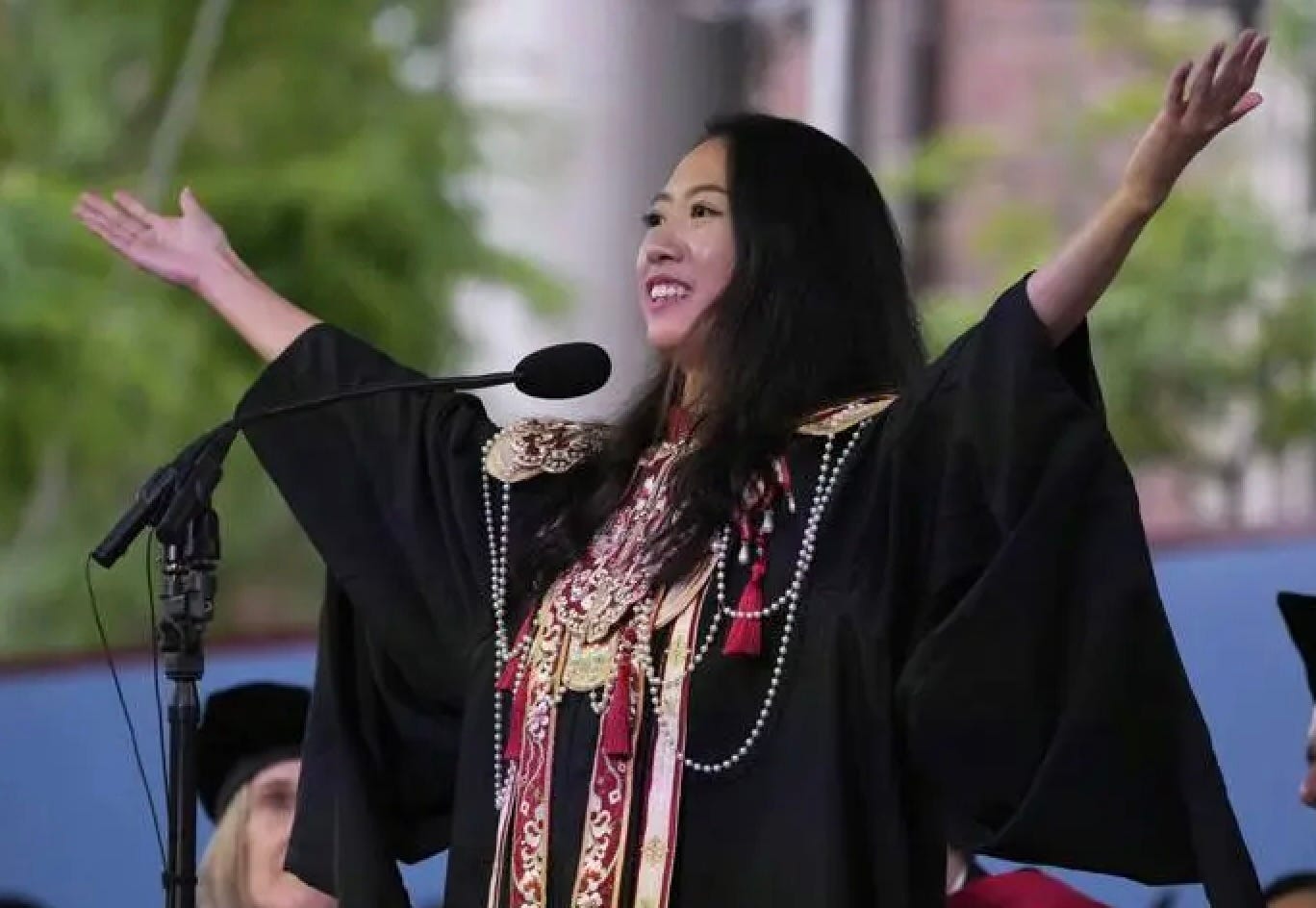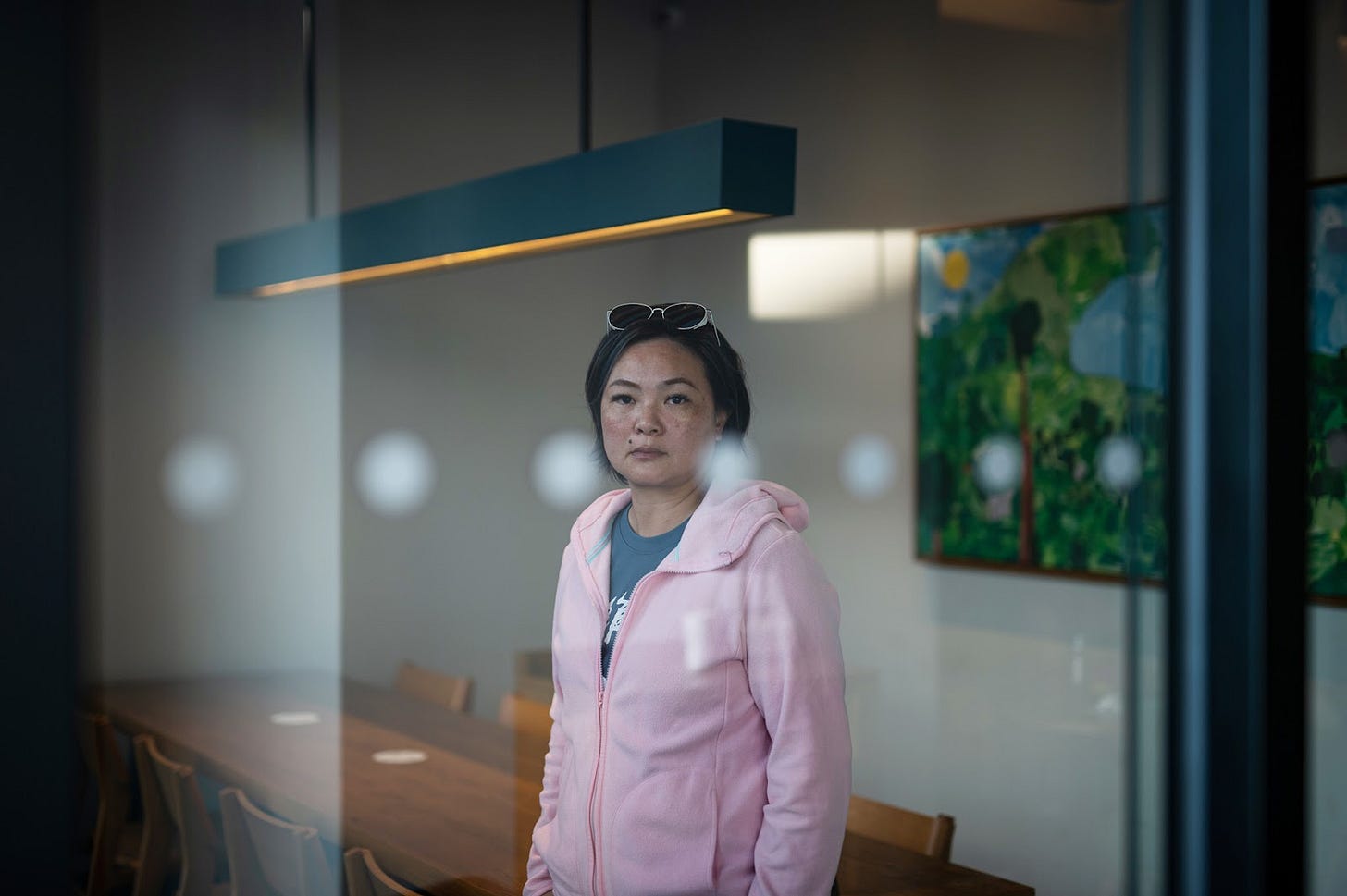Lingua Sinica Newsletter, 02 June
News, analysis, and commentary on Chinese-language media from the PRC and beyond.
Welcome back to Lingua Sinica.
It should go without saying, and yet must be said, that tomorrow marks the 36th anniversary of the brutal military suppression of pro-democracy demonstrators in and around Tiananmen Square. This is a sensitive subject that the leadership in China continues to stamp out. Understandably, references to "6.4" on platforms such as Weibo are non-existent. But the intensity of digital repression hardly captures the depth of political anxiety over the date. I recall one of our past journalism fellows from Beijing many years ago in Hong Kong relating how, growing up, it had never been possible for her to celebrate her birthday with friends — because celebrations of any kind on June 4th were forbidden. History always shivers in the present through the nerves of the Chinese Communist Party.
This week, we recommend that readers explore the extensive interview in Chinese by our colleagues at Tian Jian (田間) — our growing outlet focused on media and journalism — with Ian Johnson (張彥), founder of the China Unofficial Archives, which will publish later today. As readers mark June 4th, they can learn about the project's mission to preserve popular (民間) Chinese histories that have been censored and might otherwise be lost. Johnson recalls the words of documentary filmmaker Hu Jie (胡杰) from a 2015 interview about those in China over the past 70 years who have died for thinking independently and documenting the truth:
"They died for us, and if we don't understand, then this is a tragedy"
因為他們為我們而死,如果我們不去了解,那麼這就是一個悲劇.
But enough from me. On to our selection of stories.
Enjoy!
David L. Bandurski
CMP Executive Director
FLASHPOINTS
Propaganda Pushback
The Philippine military calls out Chinese state media for selective editing in a video after reporters cornered a military chief in Singapore.
The Armed Forces of the Philippines dismissed as "propaganda" a China Daily video showing General Romeo Brawner Jr. allegedly avoiding reporters at Singapore's Shangri-La Dialogue, held May 30-June 1. The video was posted online yesterday by "Media Unlocked" (起底), a social media brand of China Daily that takes a shallow and confrontational approach while purporting to explore topics more deeply. In the video, the "Media Unlocked" reporters appear to have not clearly identified themselves as reporters. They then allege that Brawner "dodged the question" about what they characterize as "the Philippines' recent provocations in the South China Sea."

Defense Secretary Gilberto Teodoro Jr. noted that China had not sent an official delegation to the security forum, where he addressed Beijing's assertions in the West Philippine Sea (西菲律賓海) — referring to the portion of the South China Sea claimed by the Philippines.
The incident in Singapore reflects how maritime disputes between the Philippines and China over the South China Sea have intensified in recent months and spilled over into the information space, becoming a contest of narratives. But it also offers an illuminating look at how Chinese state media go on the attack — seeking to create and distribute propaganda and disinformation on issues of core interest through prescribed proxy media brands and viral content. The “Media Unlocked” video was produced by Meng Zhe (孟哲) and Xupan Yiru (徐潘依如), who are identified elsewhere as reporters for “the Unlocked Media Studio of China Daily” — though not in the video itself. The “Unlocked” brand is part of a growing social media “studio” system implemented by central CCP-run media in recent years, partly to distance core state media brands from more provocative statements and conduct, and partly to disguise their state affiliation on social media platforms. Notably, the military delegation from the Philippines was approached at the same time by a reporter from Yutuantantian (玉渊谭天), a social media brand under the CCP-run China Media Group. In April 2023, a top CMG executive said the account had been “planned in advance and prepared over the long term to deliver powerful punches at critical moments.”
TRACKING CONTROL
Weaponizing Audits
The evidence suggests that Hong Kong is deploying tax investigations to systematically pressure independent journalism into submission.
Last month several figures in Hong Kong's media spoke out about an apparent new tactic being used to curtail the activities of independent media and journalists. Since November 2023, at least six outlets and around twenty journalists have faced tax audits spanning seven years, with demands totaling over HK$1.7 million, or more than 200,000 dollars. The targeted outlets include InMedia (獨立媒體), The Witness (法庭線), ReNews, Boomhead, Hong Kong Peanuts (香港花生), and the Hong Kong Free Press.
Tax authorities made errors and "strange, unreasonable claims," including auditing one outlet for a year before it was established and asking a journalist to pay profits tax for a nonexistent company registration number. Inspections also extend to family members, including both parents of journalists' association chief Selina Cheng (鄭嘉如). Hong Kong Peanuts host To Kwan-hang (陶君行) revealed that virtually all hosts, including Wong Ho-ming (黃浩銘) and Chow Ka-fat (周嘉發), received audit demands.
While the Inland Revenue Department (IRD), the territory’s tax collection authority, maintains that the "industry or background of a taxpayer has no bearing on such reviews,” the unified actions appear to be a form of bureaucratic censorship designed to exhaust the operations of independent media. Similar tactics have been used by authoritarian governments in Russia and Turkey, where punitive tax audits and financial sanctions have sought to control press activities. The approach would mark a new development in Hong Kong's media landscape.
For many in the Hong Kong indie media space, the IRD’s insistence that they were "randomly selected" for a probe is difficult to swallow. “I can count all of Hong Kong's non-government aligned digital media outlets on two hands,” Hong Kong Free Press founder Tom Grundy told Lingua Sinica. “Most are under tax audit simultaneously.” Grundy emphasizes that his outlet has insisted throughout its ten-year history on "meticulous record-keeping," but notes that handling the audit "has diverted resources, manpower and funds away from journalism."
The IRD audit of the Hong Kong Free Press comes one year after the outlet was selected — "randomly,” it was told — for a rare inspection from the Companies Registry, the city’s official business registration and company records authority. “We're so lucky, perhaps we should put some numbers on the lottery,” Grundy said.
AI TRENDS
Keeping the Global South in the Loop
China and ASEAN launch joint AI media initiative as Beijing expands its technological influence regionally.
On May 25, China and the multilateral Southeast Asian body ASEAN launched a joint initiative to boost AI in the media. Details on the initiative, unveiled at the China-ASEAN Media Cooperation Forum at Luoyang, are thin so far. The Chinese readout says it calls for Chinese and ASEAN media to boost cooperation in research and development for AI and AI capacity building, alongside mutual recognition of media standards on the topic. Chinese media giant Kuaishou spoke to representatives from countries like Malaysia, Singapore and Thailand on the company’s experiences with AI and “media innovation pathways.”
The forum is one data point in a wider strategy to boost China’s influence in the Global South through AI development. China has already cobbled together a group of nations at the UN united in their desire to build AI capacity, using the group as an advert for Chinese AI products. Xi Jinping has said AI will create a “lead-goose effect” (头雁效应) — that is, other countries following wherever the leader goes — and hopes it will pave the way for China to become that leader.
Invasion of the Robots
Global media outlets including BBC, NBC, and Al-Jazeera eagerly covered a humanoid robot boxing competition late last month that the state-run China Media Group claimed was a world first. In Taiwan, meanwhile, pan-blue outlets — those tending to align with the more China-friendly Kuomintang party — provided enthusiastic reports that Chinese state media then amplified as evidence of cross-strait admiration. The spectacle, featuring G1 robots from Hangzhou-based Unitree in live televised matches, represents China's latest soft power strategy — using viral-ready robot competitions to showcase supposed technological dominance while appearing less heavy-handed than traditional propaganda.
Read our recent analysis at the China Media Project.
(DIS)INFORMATION
Harvard’s Loss, Hong Kong’s Gain?
The Trump administration has attempted to ban Harvard University from enrolling international students, arguing the university has come under the sway of the Chinese Communist Party. In reality, the move appears to be a reaction to Harvard refusing to be swayed by the government's war on woke. The decision has caused shock around the world. But in China’s case, the move was also an opportunity to try to attract the endangered talent, and condemn the US as a beacon of intolerance.
No spin was necessary. The world is upside down when journalists from Chinese state news agency Xinhua get requests for anonymity from Harvard students they interviewed on campus, “for fear of retaliation from the US government.” Ministry of Foreign Affairs (MOFA) spokesperson Mao Ning was merely stating a fact when she said the US government using international students and their futures as pawns in a domestic power struggle “will only damage the image and international reputation of the United States.”
But for Chinese state media it was also an opportunity to push a long-term agenda to discredit the US. In this case, by sowing doubt around the US’s ability to guarantee the safety of its foreign students, and distracting from China’s own dubious record on academic freedom. “When a ban can shake the fate of thousands of international students at any time,” one CCTV journalist declaimed, “when academic freedom can be arbitrarily denied in the name of ‘national security’; when talents turn away due to policy turmoil - we have to ask: Can the United States continue to attract the world's best young people? Can it still play the role of the so-called ‘global knowledge hub’?”

The answer, they hope, is no. After the ban, multiple Hong Kong universities and the region’s Chief Executive John Lee announced they would support displaced Harvard students who wanted to move to continue their studies in the city’s campuses. Hong Kong University of Science and Technology (HKUST) said any Harvard student affected had an unconditional offer. But with HKUST ranking 47th in the QS world rankings over Harvard’s 4th place, they stand to gain a lot more than the exiled talent who take up this offer. Former Global Times editor and online celebrity Hu Xijin (胡锡进) said the move was a demonstration of Hong Kong’s “vitality,” a clear ability to react to Trump “destroying the open academic environment in the United States.”
IN THE NEWS
A One-Sided Tribute
The death of a Hong Kong journalist prompts a tribute from China’s government highlighting his role in cross-strait media engagement.
Kwok Wai Fung (郭偉峰), or “Guo Weifeng,” president of Hong Kong's China Review News Agency (CRNTT) — which long advertised itself as "the first digital network news agency in the greater China region" — died May 29 in Hong Kong at age 68. Kwok's passing prompted condolences from China's Taiwan Affairs Office (TAO), which took the opportunity to promote the journalist as an exemplary advocate of closer engagement between China and Taiwan. Kwok was among the first mainland journalists to visit Taiwan for reporting in 1991, arriving at Taoyuan Airport on August 12 with Xinhua reporter Fan Liying (範麗青) after 42 years of cross-strait separation.
The TAO praised Kwok's work establishing China Review (中國評論) magazine in Hong Kong in 1998. During the recent Cross-Strait Media Summit in Beijing, an official event led by the government-run Xinhua News Agency and China Daily, CRNTT promoted new media as a platform for youth dialogue across the strait, with Chang Jung-kung (張榮恭), a member of the Central Advisory Committee of Taiwan's opposition Kuomintang (KMT) party and an advisor to Meihua Media Group (梅花媒體集團), advocating for such digital exchanges — which have been seen in Taiwan as divisive and potentially harmful. (Stay tuned to Lingua Sinica for more on the Meihua Media Group).
In praising Kwok, the TAO was in fact praising one of its own. According to company registration files in Hong Kong, China Review News Agency Limited remained 50 percent held by Kwok at its latest annual filing in February this year. The remaining shares were held by Wang Ping (王平), the deputy director of CRNTT. Despite this apparent private status, however, CRNTT has direct links to the Chinese government. The agency was founded in 1997 under the direction of Wang Daohan (汪道涵), a former Shanghai mayor who at that time was president of the Association for Relations Across the Taiwan Straits (ARATS) — an ostensible social organization directly under the management of the Taiwan Affairs Office.
SHORT STORIES
| China |
Romance Lockdown
According to reporting by Taiwan’s Central News Agency, scores of writers in China have been arrested or fined for publishing on the Taiwan-based adult fiction website Haitang Literature (海棠文學城), which allows authors to earn money through subscriptions and tips. More than 50 writers of "danmei" (耽美) — romantic fiction featuring male-male relationships typically written by women — have been detained since June 2024 in what critics call "remote fishing" (遠洋捕撈). This refers to the practice by the authorities of crossing jurisdictions to make arrests. Police in Anhui province initially targeted high-earning Chinese authors on the platform, while recent arrests in Lanzhou focused mostly on young writers, many university students, who made just a few thousand yuan through their online writings. Several writers implicated in the crackdown posted on Weibo about depression and suicidal thoughts before their accounts were deleted. CNA reports that lawyers in Beijing and Shanghai have formed pro bono legal aid teams to assist detained authors. So far, no coverage of this story has appeared in the media inside China.
Cave Cleanup
A viral social media video exposing a garbage-filled karst cave in the scenic area of Zhangjiajie in Hunan province triggered China's characteristic "swatting at flies" (打苍蝇) media response — with outlets like Shanghai-based Guancha (观察者网) and The Beijing News (新京报) tackling local environmental negligence after years of feckless silence. The polluted cave in Cili County (慈利县), created by illegal waste discharge from three livestock farms now under investigation, contained 2.7 tons of refuse including water bottles dating to 2015, suggesting years of contamination that went unchecked. The Beijing News questioned how authorities had failed to notice the waste dumping, which had gathered despite constant complaints from residents over unstable water quality. Back in March, facing citizen pressure, the local government issued perfunctory cleanup notices but ignored the underlying causes. Action was only forced last month, when heavy rains caused sewage overflows. What might make a real difference? Active local media.
| Taiwan |
Pro-China Snack Attack
Taiwan's Mainland Affairs Council (MAC) condemned Want Want China Times Media Group (旺旺中時媒體集團) for making comments at the Cross-Strait Chinese Culture Summit in Beijing that it said damaged Taiwan's sovereignty, adding that it would investigate if the group had colluded with China and contravened cross-strait regulations. "We are Chinese," Want Want Holdings general manager Tsai Wang-ting (蔡旺庭) said at the May 28 summit, referring to China as the "motherland" and Taiwan as "China Taiwan." The MAC said the media group, which frequently conveys what critics in Taiwan regard as pro-China positions, had become "a pawn in the CCP's united front work against Taiwan." It said it would examine whether Want Want's actions violated regulations prohibiting cooperation with China's party, government, or military apparatus. Tsai Wang-ting is the third son of firm founder Tsai Eng-meng (蔡衍明), who succeeded his father as chairman of the snack food company Want Want China in 1987.
| Hong Kong |
Sundials for Security
Media outlets in Hong Kong, including InMedia HK and HK01, have reported that Hong Kong's Education Bureau has updated its National Security Education Curriculum Framework to align with China's Patriotic Education Law and emphasize "comprehensive security" (大安全). The framework now requires national security concepts in Hong Kong schools in subjects ranging from mathematics to physical education. Primary students must learn about the Hong Kong National Security Law (香港國安法) and the Safeguarding National Security Ordinance (維護國家安全條例), while secondary students will devote more time to the study of China's political system, including the leadership role of the Chinese Communist Party. Physical education lessons will teach students about traditional Chinese sports like shuttlecock. Mathematics classes, meanwhile, will explore such devices as ancient Chinese sundials in order to build "awareness of protecting cultural security."
| North America |
Viral Valedictions
The World Journal (世界日報), a Chinese-language outlet with online and print editions across the United States, reported that graduating Harvard University student Yurong “Luanna” Jiang (蔣雨融), who is from China, received polarized reactions to her graduation address at the Ivy League institution. While some Chinese netizens praised the "international vision" shown in Jiang’s speech — titled "Safeguarding Our Humanity” — others criticized her message as a false story of inspiration for ordinary families. Not surprisingly, perhaps, Jiang's background was scrutinized after her speech went viral in China. Netizens found that she is the daughter of Jiang Zhiming (蔣志明), executive director of the Chinese state-backed environmental organization China Biodiversity Conservation and Green Development Foundation (中國生物多樣性保護與綠色發展基金會). Given Harvard's annual tuition and living costs would demand around 700,000-800,000 yuan, or between 96,000 and 110,000 dollars, they questioned Jiang’s claim to have come from an "ordinary" family and suggested — without proof, mind you — that her admission may have benefited from elite connections. Over on his Substack account, the exiled Hong Kong activist Nathan Law Kwun-chung (羅冠聰) noted Jiang’s used in her speech of the words “shared future” in close proximity to the word “humanity” — suggesting possible echoes of one of Xi Jinping’s core foreign policy concepts.
SPOTLIGHT
Hidden Predators
A victim-led investigation exposes a history of sexual abuse in Taiwan’s schools.
The Reporter, one of Taiwan’s leading independent news outlets, broke new ground with its investigation into decades of concealed sexual abuse in Taiwan's elementary schools, revealing how victims themselves — not officials or advocacy groups — finally brought a serial predator to justice.
The investigation centers on Liu Yu-cheng (劉育成), a former elementary school principal in Nantou County who sexually abused students across four schools over three decades. Unlike previous scandals exposed by NGOs or politicians, Liu's crimes came to light when adult survivors connected online in 2023, conducting their own evidence-gathering campaign.
Chuang Chun-ching (莊純青), abused by Liu in sixth grade, led the grassroots investigation. "Confronting these cases is also a way for me to heal my wounds," she told The Reporter. Using Facebook and graduation yearbooks, the survivors identified 36 victims and witnesses, creating detailed files and chronologies that enabled authorities to launch their first comprehensive investigation.
The case exposes systemic failures in the past to protect children in Taiwan's schools. When two girls reported Liu in 2003, school officials buried their complaints. Liu cultivated relationships with local politicians who shielded him from consequences, allowing the abuse to continue unchecked. The Reporter's investigation revealed similar patterns nationwide, including the case of Chang Po-Sheng (張博勝), a Tainan teacher who abused 30 students but received only a four-year sentence. The 2023 Gender Equity Education Act introduced reforms requiring thorough investigations, but statutes of limitations still prevent prosecution of many cases where victims speak out decades later.
Of 29 identified victims in Liu's case, only four could pursue legal action due to time limits. Liu received a 15-year sentence, currently under appeal.
Human Ripples of the Harvard Standoff
A rare look at how international students weathered Trump's 21-hour university siege.
Initium Media captured the human drama behind a geopolitical crisis when the Trump administration stripped Harvard's 7,000 international students of their legal status on May 22, interviewing Chinese and Taiwanese students caught in an unprecedented 21-hour standoff.
The Singapore-based outlet documented how students coped with sudden uncertainty through dark humor and solidarity. Patrick (帕特里克), a Chinese architecture student, walked out of the US consulate in Wuhan with a visa refusal after the officer asked, "Didn't you see the news?" Andy (安迪), a Kennedy School graduate, defiantly posted before flying to Boston: "Harvard won't kneel — we'll die standing up."

Initium's reporting revealed the policy's sweeping impact beyond enrollment. Students on work permits faced immediate job loss, while those abroad scrambled to return within 72 hours. In group chats, students shared gallows humor: "I will be reborn as an MIT student."
The crisis began when Harvard refused Trump administration demands to audit students' political ideologies and provide records of protest participants. Unlike Columbia University, which capitulated to preserve 400 million dollars in federal funding, Harvard sued the government — becoming the first university to mount such resistance.
Twenty-one hours after the suspension, a federal judge restored Harvard's international student program through a temporary restraining order. Students celebrated, but the episode left many reconsidering their American dreams and questioning whether their education investment remained worthwhile amid escalating political hostility.
"Pretty exciting, haha, don't you think it's pretty exciting?" one student told Initium.










